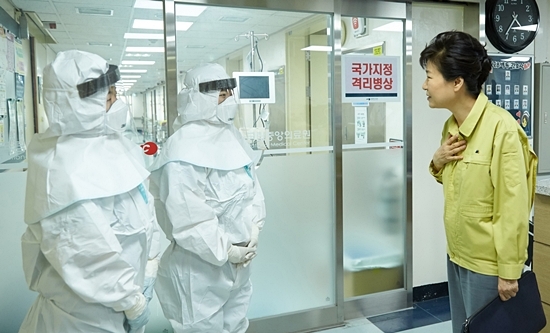[Newsmaker] Korea’s MERS concerns more about politics than health
By 옥현주Published : July 5, 2015 - 16:32
South Koreans tend to perceive the outbreak of Middle East respiratory syndrome as a political issue, not a health issue, illustrating a different attitude from what they showed during the flu pandemic that hit the country in 2009, a study revealed Sunday.
According to research led by a public health professor at Seoul National University, Koreans appeared to be more concerned about politics than the deadly virus itself, with the popular words used on Twitter in relation to the outbreak being ones with political meanings, like response, president and quarantine.

The team analyzed the frequently used words on social media to learn Koreans’ sentiments during the two outbreaks. Considering that Koreans mainly blogged in 2009 and have since gone to Twitter to communicate with others online, the research team studied both blog posts and tweets associated with the flu pandemic and MERS to find out the trends in discussions of the diseases.
The most-mentioned figures on Twitter from May 20 to June 18, at the height of the local MERS outbreak, were President Park Geun-hye and Seoul Mayor Park Won-soon, rather than health-related officials, the report showed.
The two have exchanged criticism over the handling of the outbreak since the mayor revealed in early June that a confirmed MERS patient might have exposed more than 1,500 Seoul citizens to the deadly virus.
Mayor Park publicly blasted the government’s failure to monitor suspected MERS patients and hiding key information from the public and municipalities, vowing to find its “own ways” to protect Seoul residents.
President Park, however, lashed out at the mayor, saying municipalities’ independent actions could add to public confusion. The conservative ruling Saenuri party also accused the liberal mayor of spreading “false” rumors.
Eight out the 10 most-mentioned names on Twitter were politicians. Health Minister Moon Hyung-pyo was ranked seventh.
The result drew a clear contrast from how the people responded to the swine flu pandemic of 2009. The disease infected about 760,000 Koreans and claimed 263 lives until it abated a year later.
During the 2009 flu pandemic, the most-mentioned person on blogs from April 28 to Sep. 2 was Park Seung-chul, then-leader of the government’s task force to fight the epidemic.
Dr. Kim Woo-joo, the head of the Korean Society of Infectious Diseases, took the No. 2 spot at the time, followed by Jeon Jae-hee, then-minister of health and welfare, and Lee Jong-gu, a former director of South Korea’s Centers for Disease Control and Prevention.
Key politicians made it into the 10 most circulated names, but ranked lower down than health-related figures. Former President Roh Moo-hyun was the fifth most-mentioned name, followed by then-President Lee Myung-bak and U.S. President Barack Obama.
Back then, Koreans mainly made comments about the disease itself, with such words as prevention, vaccine, infection, influenza and virus being the most-used words on blogs.
Professor Yoo, who led the research, pointed to a lack of communication between the government and the public as the reason behind the stark difference in Koreans’ way of viewing the 2009 flu pandemic and the MERS outbreak.
“As citizens saw signs of lacking communication in responding to the MERS crisis, compared to the 2009 epidemic, they turned to politicians taking charge of managing crisis,” Yoo noted.
The researchers also found that information about MERS-affected hospitals was spread on Twitter before it was made public by the government.
From May 28, tweets that read “Don’t go to Yeouido St. Mary’s Hospital for a while” were circulating until the hospital in question officially announced on May 31 that a confirmed MERS patient had been detected at its facilities.
Saying that the information could spark public panic, health authorities declined to name the hospitals that had confirmed MERS patients. It finally revealed the list on June 7 amid growing public calls for the information.
Information about Samsung Medical Center, which has been the biggest source of MERS contagion to date, also went available on Twitter two days before the hospital made public that it had a confirmed MERS patient in its emergency room.
“Netizens seemed to actively exchange information about MERS-stricken hospitals to refrain from going to the facilities, which we think in part contributed to preventing additional infections,” the research team said.
MERS has killed 33 people in Korea, with more than 186 diagnosed as of Sunday, since the nation reported its first case in May. Korea has seen the biggest outbreak of MERS outside Saudi Arabia, where the virus was first discovered in 2012.
By Ock Hyun-ju (laeticia.ock@heraldcorp.com)


![[AtoZ into Korean mind] Humor in Korea: Navigating the line between what's funny and not](http://res.heraldm.com/phpwas/restmb_idxmake.php?idx=644&simg=/content/image/2024/04/22/20240422050642_0.jpg&u=)
![[Exclusive] Korean military set to ban iPhones over 'security' concerns](http://res.heraldm.com/phpwas/restmb_idxmake.php?idx=644&simg=/content/image/2024/04/23/20240423050599_0.jpg&u=20240423183955)



![[Graphic News] 77% of young Koreans still financially dependent](http://res.heraldm.com/phpwas/restmb_idxmake.php?idx=644&simg=/content/image/2024/04/22/20240422050762_0.gif&u=)
![[Herald Interview] Why Toss invited hackers to penetrate its system](http://res.heraldm.com/phpwas/restmb_idxmake.php?idx=644&simg=/content/image/2024/04/22/20240422050569_0.jpg&u=20240422150649)





![[Exclusive] Korean military to ban iPhones over security issues](http://res.heraldm.com/phpwas/restmb_idxmake.php?idx=652&simg=/content/image/2024/04/23/20240423050599_0.jpg&u=20240423183955)



![[Today’s K-pop] Ateez confirms US tour details](http://res.heraldm.com/phpwas/restmb_idxmake.php?idx=642&simg=/content/image/2024/04/23/20240423050700_0.jpg&u=)